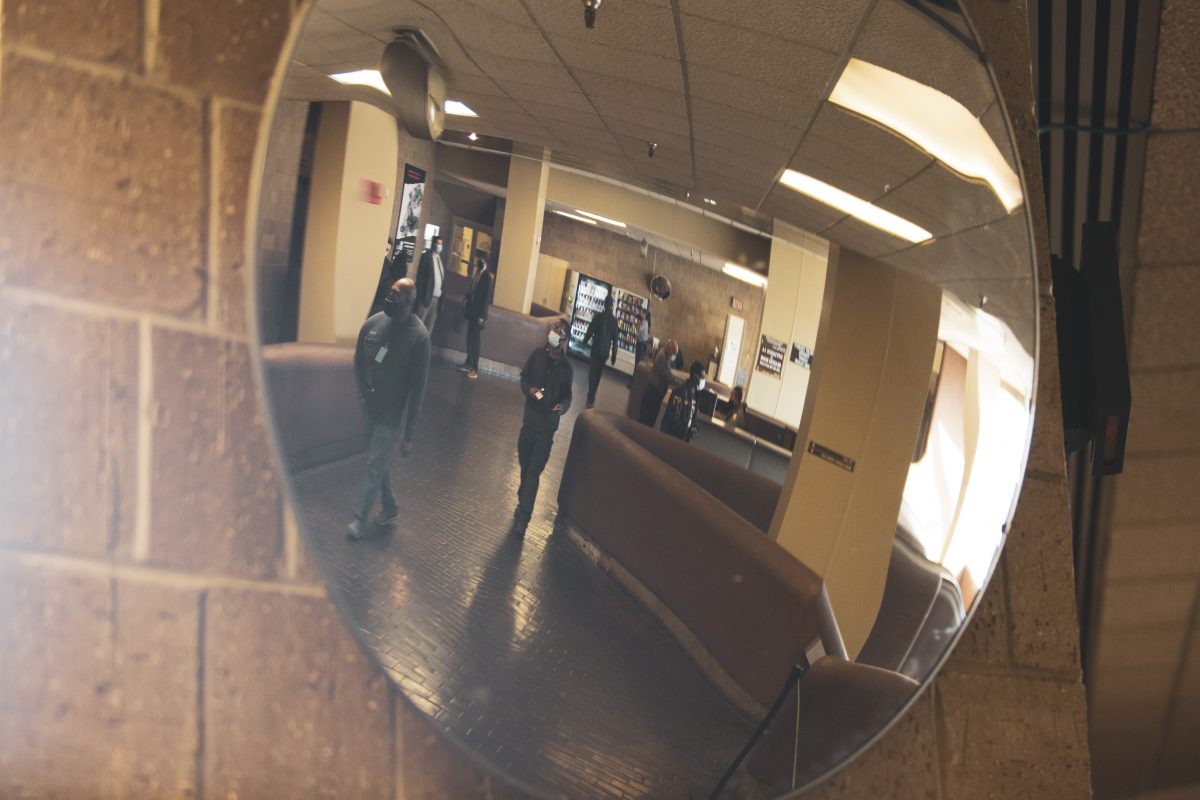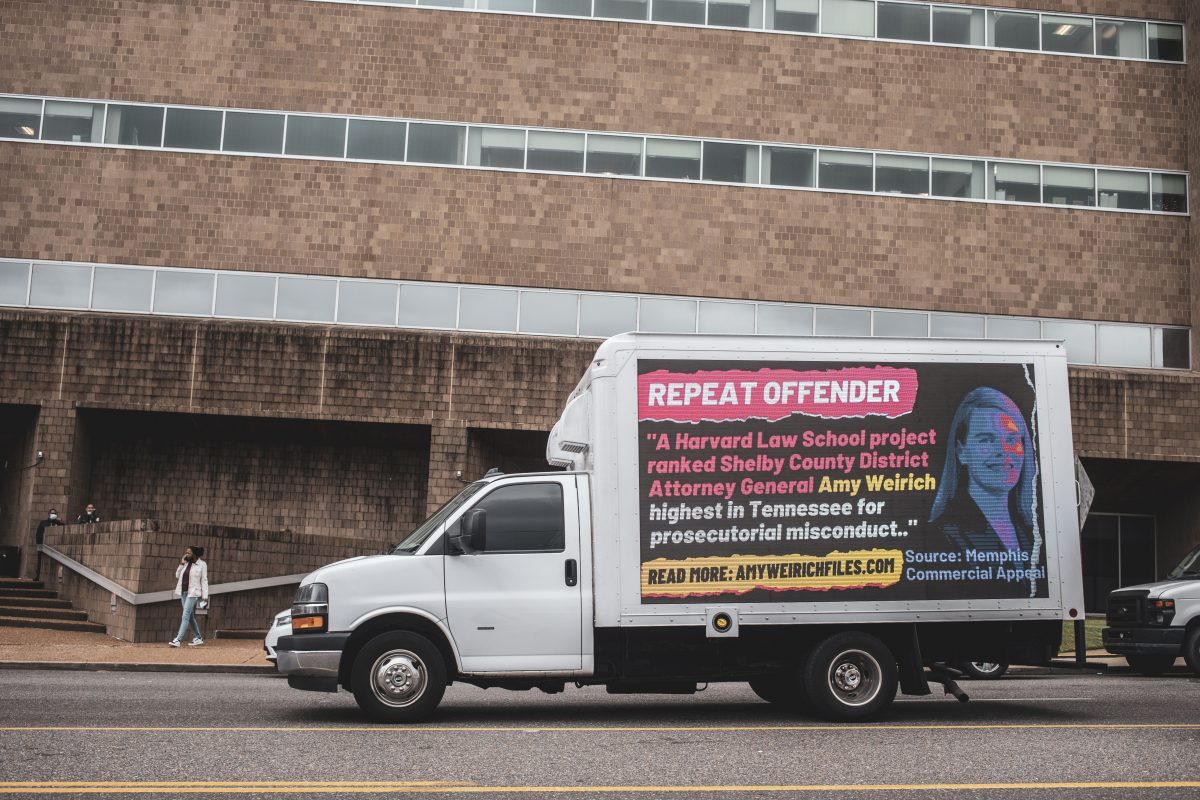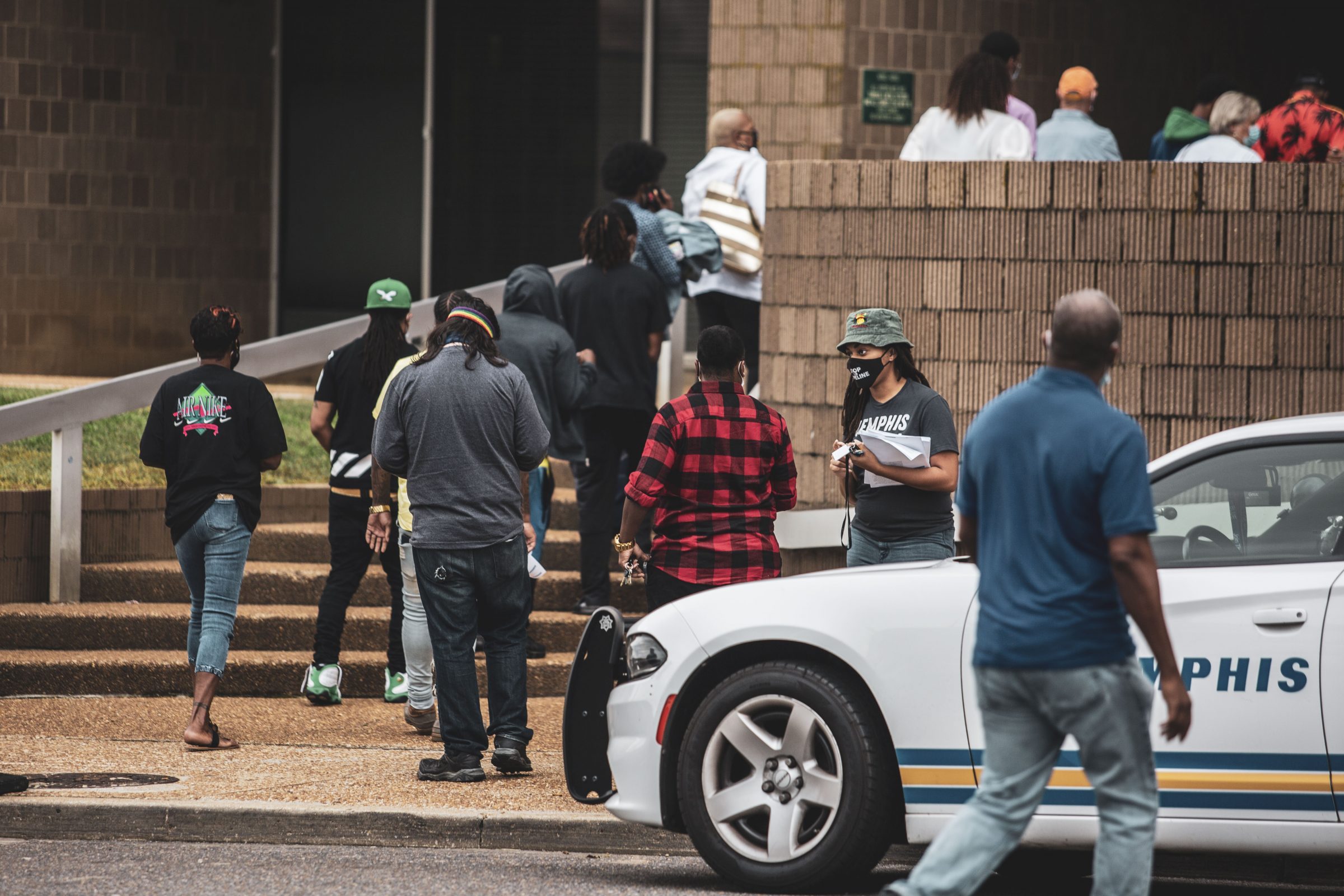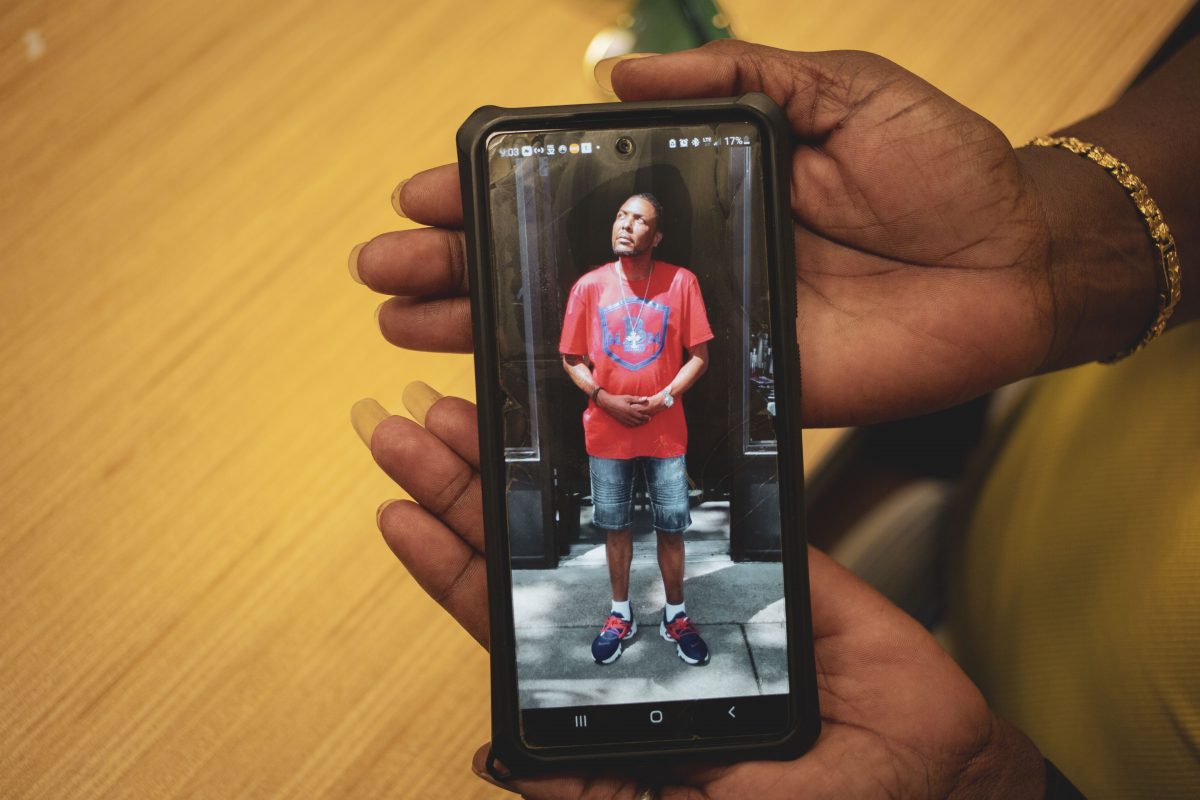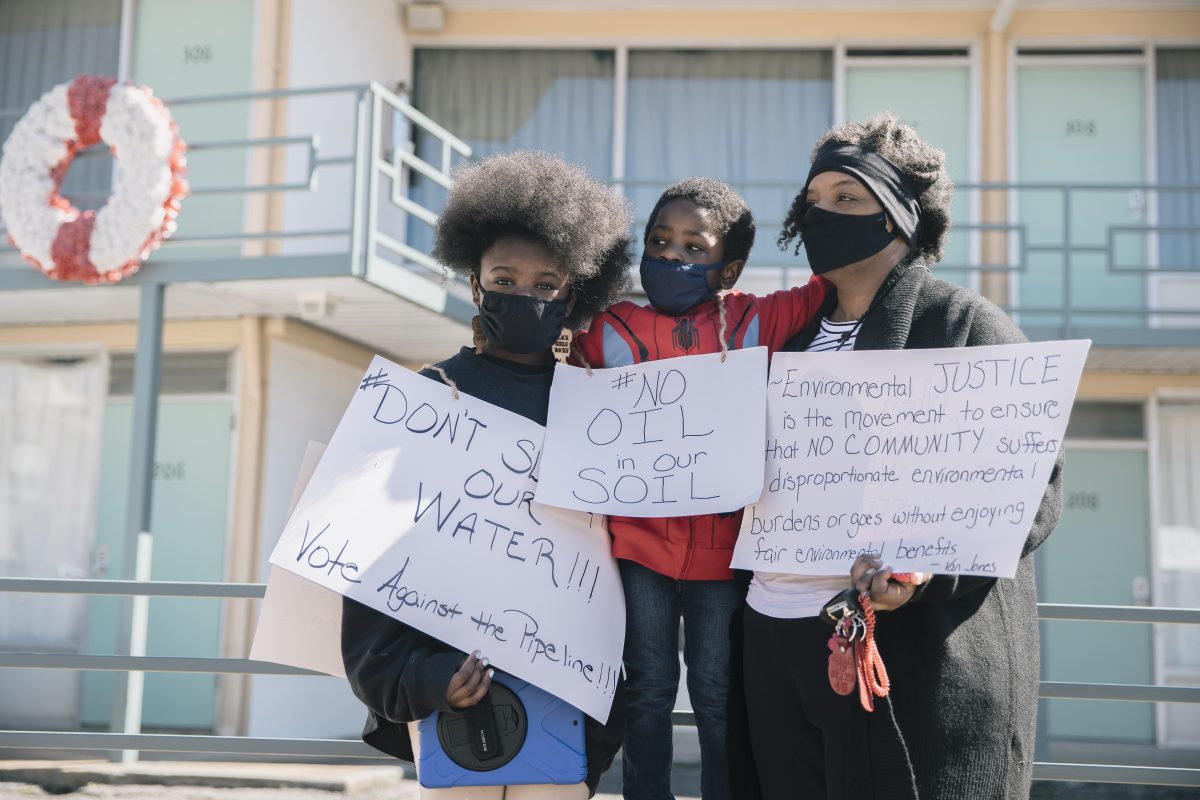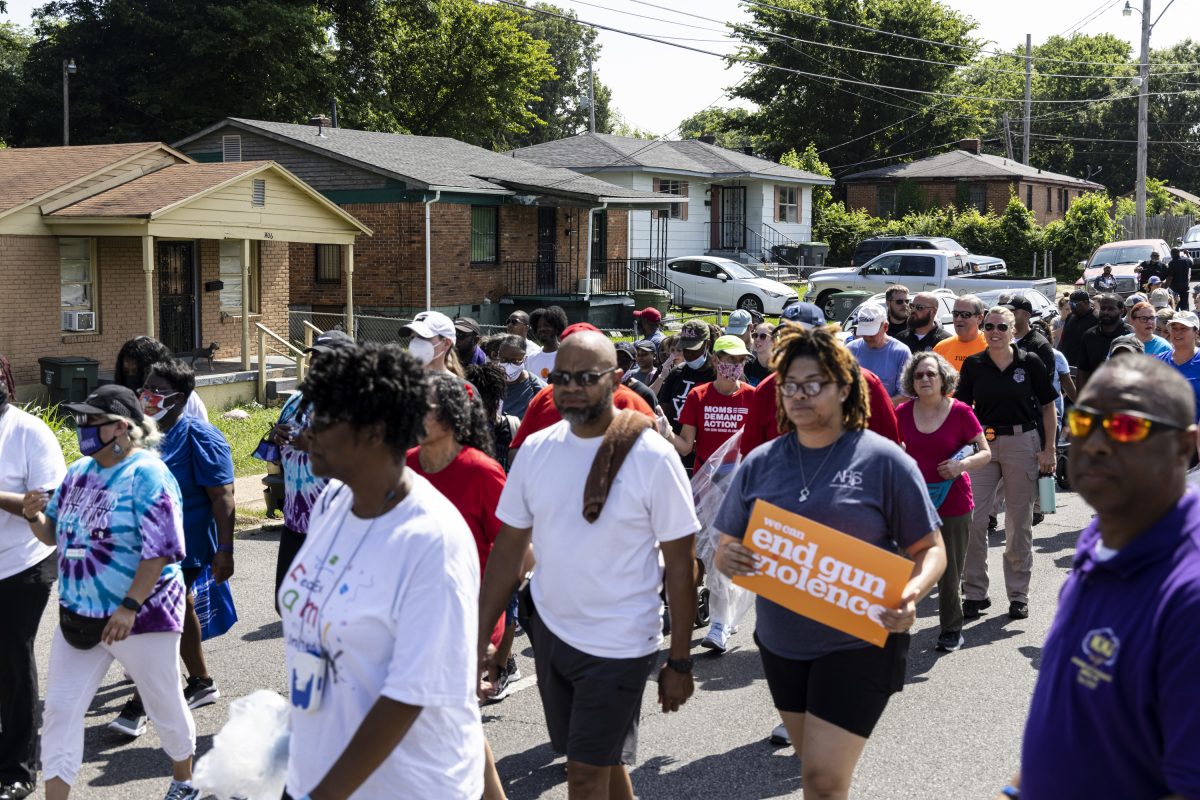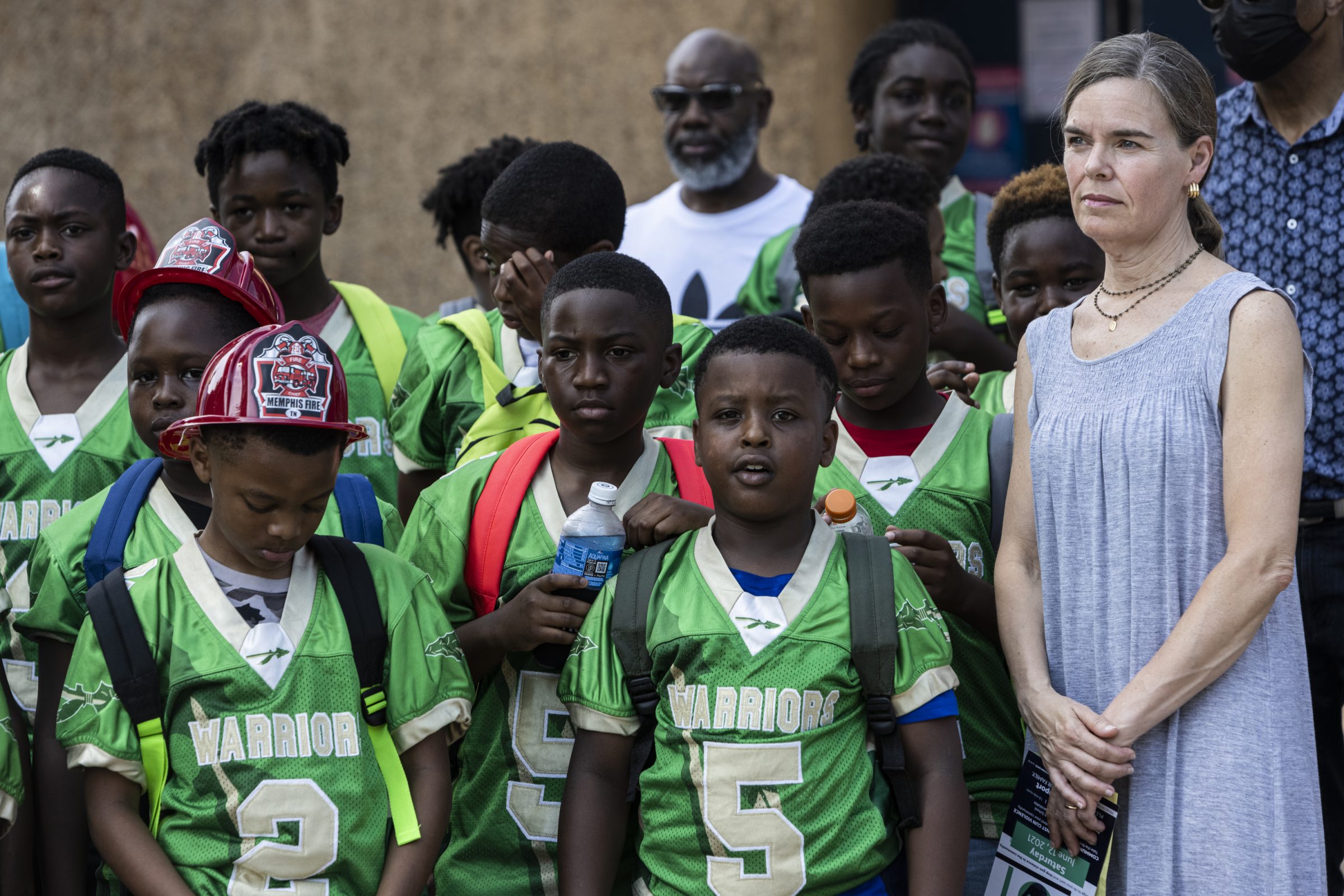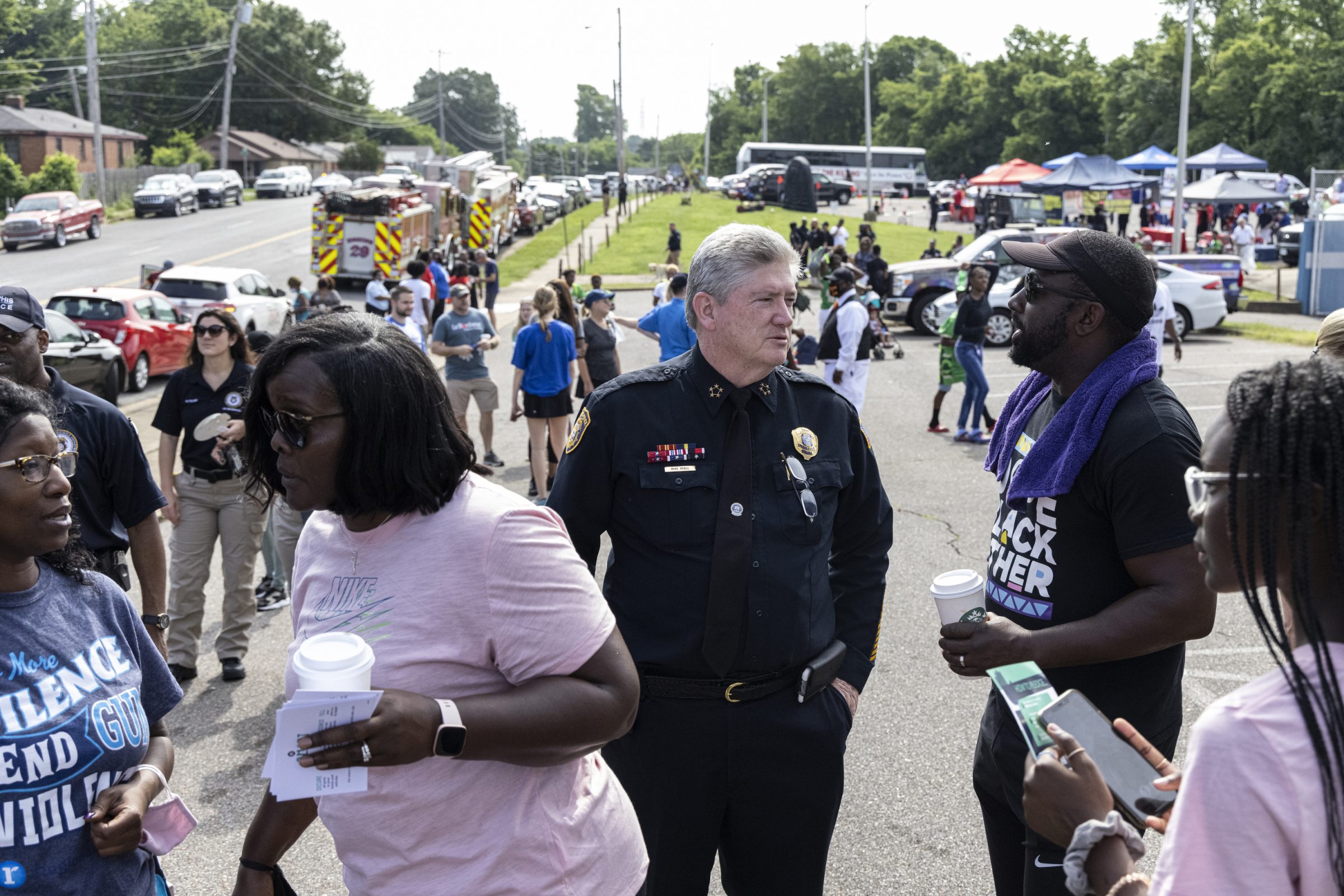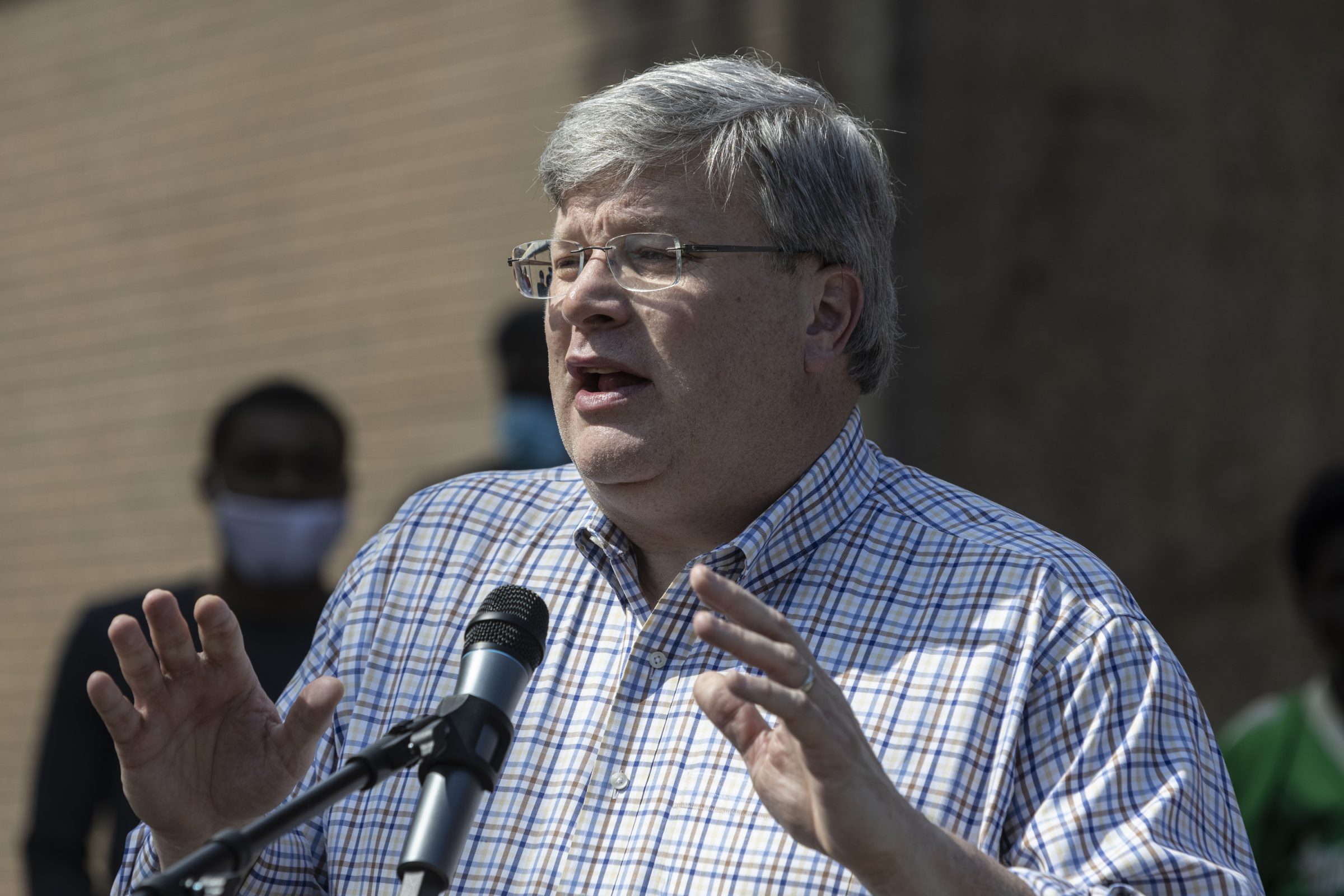This story first appeared in MLK50: Justice Through Journalism, a nonprofit newsroom focused on poverty, power, and policy in Memphis. Sign up here to receive MLK50’s weekly newsletter.
MLK50: Justice Through Journalism is guided by the principles of the SPJ Code of Ethics to balance the public’s right to know against causing potential harm. We are also informed by the principles in the Authority Collective’s call in “Do No Harm: Photographing Police Brutality Protests.” In order to protect the people quoted in this story from retribution and surveillance, we offered participants the option to use their first or last name only, and deleted some identifying details. We chose to provide anonymity for one participant.
On a recent morning, a poster on the wall near escalators inside the Shelby County Criminal Justice Center, downtown at 201 Poplar Ave., shared a message about criminal justice in the county.
When Carlos was held up, he lost his father’s watch. And the guy who did it just lost ten years. The District Attorney General of Shelby County has no interest in making deals with violent criminals. If you do it, you’ll get every second of hard time we can give you for it. Count on it.
NO DEALS. HARD CRIME GETS ALL THE TIME.
On the other side of the escalators, Jackson leaned against a wall, waiting to appear in court.
Some people sat with blank stares or with their heads down. There was little chit-chat among those waiting, but Jackson was talkative. This wasn’t his first trip to 201, as the building is informally known. He said he knew what to expect from the prosecutors and judge.
“They’ll never know how it feels on our side because they ain’t got no felonies,” said Jackson, who has served time for non-violent drug offenses. “They on the other side just looking like, ‘…We need to do this to them.’ They ain’t (going) through what we (go) through.”
With the district attorney up for reelection this summer, Jackson and others facing prosecution, have thoughts on how they would change the DA’s approach. Activists are mobilizing against the incumbent, Republican Amy Weirich, who is not expected to have a challenger in the primary race. On the Democratic side, three attorneys are vying for her seat. Those candidates — Linda Harris, Steve Mulroy and Janika White — see an office that needs reform. Their platforms overlap, sharing the goals of reducing violent crime, earning community trust, and correcting for discrimination.
Weirich, who has been the DA since 2011, told The Commercial Appeal last month she believes her office has been firm on violent crime, considerate of community concerns, and fair. In 2017, she received a private reprimand for withholding evidence in the high-profile murder case of Noura Jackson, whose conviction was overturned after she’d spent nine years in prison. That same year, a Harvard Law School project also ranked Weirich highest in Tennessee for prosecutorial misconduct. Weirich did not respond to a request for comment.
Early voting in the partisan primary starts April 13 and ends on election day, May 3; the countywide general election is Aug. 4. The general election also includes races for county mayor, commissioners, sheriff and judges.
In Tennessee, district attorneys serve for eight years – the nation’s longest term for elected prosecutors. It will be nearly a decade before the office is up for reelection again.
A district attorney’s job is to represent the government in criminal cases. Aided by a staff of attorneys, the elected prosecutor decides which crimes to focus on, what charges to bring, if any, and whether to offer plea deals.
However, a district attorney has a lot of say in how to go about that work. Across the country, there’s a growing public conversation about what it means to be a good district attorney.
Since the beginning of the year, the Democratic candidates have made appearances at events focused on DA-related issues. Outside 201 Friday, Mulroy attended a protest in support of Pamela Moses, a Black activist from Memphis, sentenced Jan. 31 to six years and one day in prison on voter fraud charges. Moses, who had prior felony convictions, registered to vote after election officials incorrectly told her she was eligible to do so.
Last week, White, Harris and Mulroy attended a rally supporting Pervis Payne, a Black man who has maintained his innocence despite a 1988 conviction for killing a white woman and her child.
Although the U.S. Supreme Court ruled in 2002 that people with an intellectual disability, such as Payne, should not be subject to the death penalty, Weirich maintained that Payne, whose IQ has been measured at 72, should be executed. She also opposed DNA testing in Payne’s case. In November, her office acknowledged his intellectual disability and dropped its pursuit of the death penalty. Payne will be eligible for parole in five years.
At a January virtual forum, organized by the Sigma Rho Lambda Chapter of Alpha Phi Alpha Fraternity, the three discussed changes they would push for as DA. Among the issues they raised were bail reform, ending transfers of children to adult court, offering more alternatives to prosecution and making data about prosecution publicly available.
During the virtual forum, Harris, who is Black, highlighted the need for DAs to work with communities to prevent crime. She is a private practice attorney, former federal prosecutor and former Memphis police officer.
A law professor at the University of Memphis, Mulroy, who is white, presented an approach guided by policies that have yielded results in other cities. The former county commissioner was also a federal prosecutor.
Changing the internal culture of the district attorney’s office and ensuring the demographics of the office reflect Memphis would be a key priority for White, who is Black. She is a private practice attorney.
Whichever candidate wins, their decisions will have critical power over criminal justice in the county. Inside 201, people like Jackson feel the effects of that power.
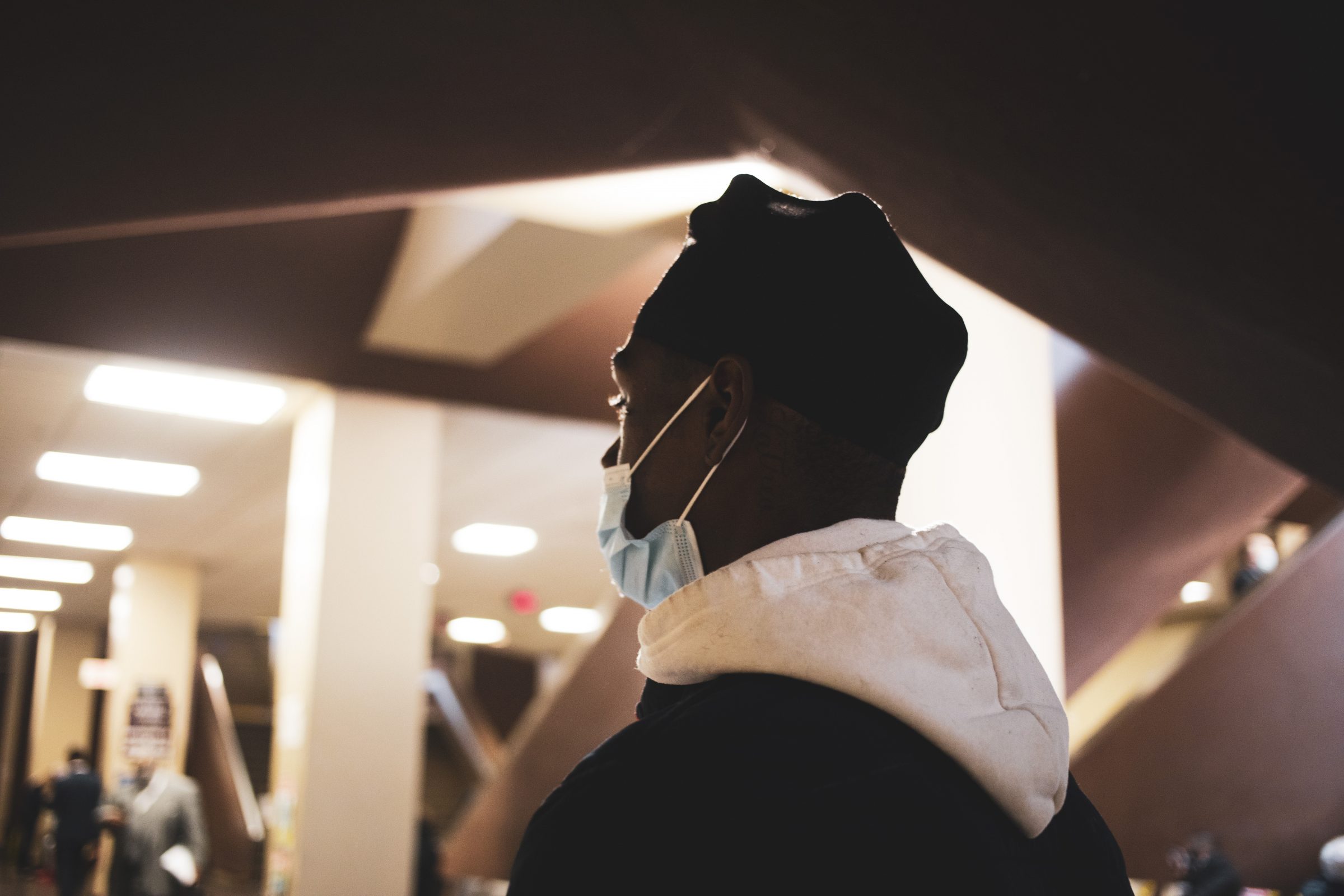
Be reasonable
A woman sat on a bench and thumbed through a phone, trying to figure out how to get a lawyer for help with a theft charge.
“I’m a server, so I really don’t get paid much,” she said. “I’ve got to figure out how I’m going to pay for my lawyer and how I’m going to get to court dates, and you know, it’s really stressful.”
The first time she was charged with a crime – for fighting – she was a teenager and living in Mississippi. Now, she lives with a relative in Memphis. She says a good district attorney candidate would do one thing: “Be reasonable with us.”
If the district attorney’s office spent more time trying to understand why someone broke the law, she said, prosecutors would be more understanding and see that charges may not be necessary and too harsh for the situation.
“Ask what’s going on, why you did that, what was the actual reason for it…and the situation that’s going on.”
She sees the circumstances that led to this 201 visit as an example.
“In the house that I live in, it’s basically everybody for themselves. I was just trying to get some things to put in the house for me, so I wouldn’t have to eat out all the time, and personal care items.”
She doesn’t dispute that theft is a violation of the law. But at the same time, it seems like a relatively minor situation compared to violent crimes that should be the DA’s focus, she said. Prosecuting people like her does less for safety and more to add stress for people already struggling to make ends meet, she said.
“If they would stop worrying about the little small things and worry about the bigger things… it would be a big weight off people’s shoulders.”
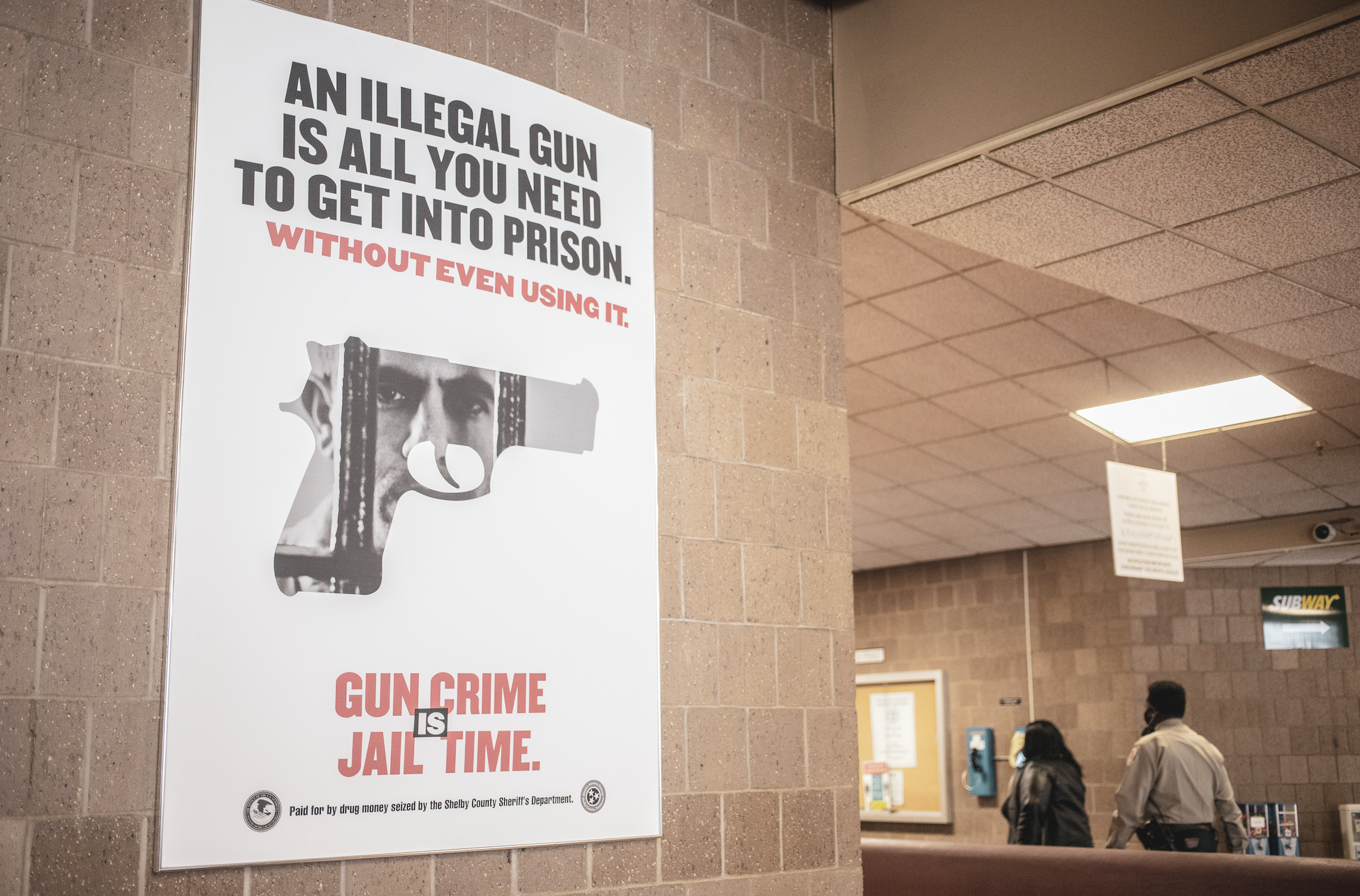
Skip the small stuff
Some people at 201 say the DA is too aggressive with petty infractions, creating a cycle that lengthens criminal records and bars them from jobs that could help them get out of the criminal justice system — a potentially lifelong consequence that is too harsh for small offenses.
Jackson said his record has left him with few legal ways to make ends meet.
“It’s hard for y’all to make these promises that we’re going to make it to where they’ll stop targeting the Black community when really it’s already been targeted, the harm is already done.”
Jackson described a cycle that begins with police officers over-patrolling Black communities, pulling people over for minor violations, and using the opportunity to run them in on additional charges. For people with criminal records, those stops serve only to saddle them with more severe charges and sentences, even if the offenses are years apart.
What prosecutors and judges don’t consider, Jackson said, is how long someone’s stayed out of trouble.
”Every time they get me, it’s like they judging me off my prior record. That’s bad to be able to judge somebody off their prior record as if a person can’t do better in life.”
Jackson isn’t sure how other reforms can be effective if people are stuck in that loop.
As he waited for court, Robinson said he earns a living through construction work, one of few jobs he can hold with a criminal record.
“Simple shit shouldn’t cost you three or four years of your life when you got rapists, killers and drug dealers out here,” Robinson said, referring to issues such as driving with an invalid license.
“Everybody can’t take off every month, everybody can’t take off every other week. And then when you lose your job, all because of coming down here, they finally tell you, ‘We going to dismiss it.’”
Permanent records and jail time for petty crimes are a burden connected to high poverty rates in Black communities, argues Robinson, who is from South Memphis.
“That’s because they put us in poverty. We can’t get no job with all this shit on our background,” Robinson said. “I done been locked up so many times; it don’t make no sense. And the majority of it for petty stuff, stuff I know could have been overlooked.”
Wrongful conviction
Between General Sessions courtrooms, Terrance waited with his hands tucked in his hoodie.
“Memphis, we ain’t really got a lot; that’s why there’s a lot of murders,” Terrance said. Kids in low-income neighborhoods have fewer educational and employment opportunities, he said, making them easily “brainwashed” by the streets — like he was.
“But at the same time, it’s about you though,” he tells the kids from his neighborhood, urging them not to follow his path. “I don’t care where you at. You ain’t got to be a part of everything. You can switch it up.”
With the streets behind him, Terrance said he wants to leave the city when he’s done with his case. “I’m going to switch it up,” he said.
For him, one reform to the DA’s office is more important than any other: Wrongful convictions. He said prison for an innocent person is the cruelest of injustices with unjustifiable costs.
“My perspective is who the fuck wants to serve 40 years when they’re innocent? You ain’t seen your kids. You don’t know what’s going on, what movie is out, you got to catch up on a whole bunch of stuff, the years that passed.”
The Democratic candidates have expressed support for creating a conviction review unit in the DA’s office that would look for wrongful convictions. And despite requests from advocacy groups for one in Shelby County, Weirich has resisted the idea, according to The Commercial Appeal.
A DA that’s been through something
Taye wasn’t happy to be at 201, but he was there to support a friend fighting a case.
“I don’t like being around all these damn police. They ain’t did nothing and I ain’t got no warrants or nothing, but still, it just brings back old memories of the old life that I put behind me.”
Taye isn’t sure about specific policies he wants to see from a new district attorney. Still, he knows he’d like a district attorney who has experienced the same struggles as people in Memphis’ low-wealth, mainly Black neighborhoods.
“Shelby County does need a new DA, but we need a DA that got a testimony,” Taye said. “We should have a DA – I won’t say from the hood or grew up in the ghetto, but… we should have a DA that’s been through something, if you ain’t been through something, at least have a family member that’s incarcerated.”
Jackson agreed, but he’s heard election promises of change before, he said. Even if a Democratic challenger wins, the real question is whether they will stand by their commitment to reform if they face resistance.
“Who didn’t say they’re going to help the Black community? Everybody’s said that,” Jackson said. “I’m not even faulting the people who’re saying it. … But are y’all going to be willing to take that extra measure when the people above your heads say no? Are you going to stand down or stand earnest and say ‘No, they don’t deserve this, this is how we’re going to do it?’”
“You’re going to have to be very strong to really do what you say behind Black people.”
Carrington J. Tatum is a corps member with Report for America, a national service program that places journalists in local newsrooms. Email him at carrington.tatum@mlk50.com
